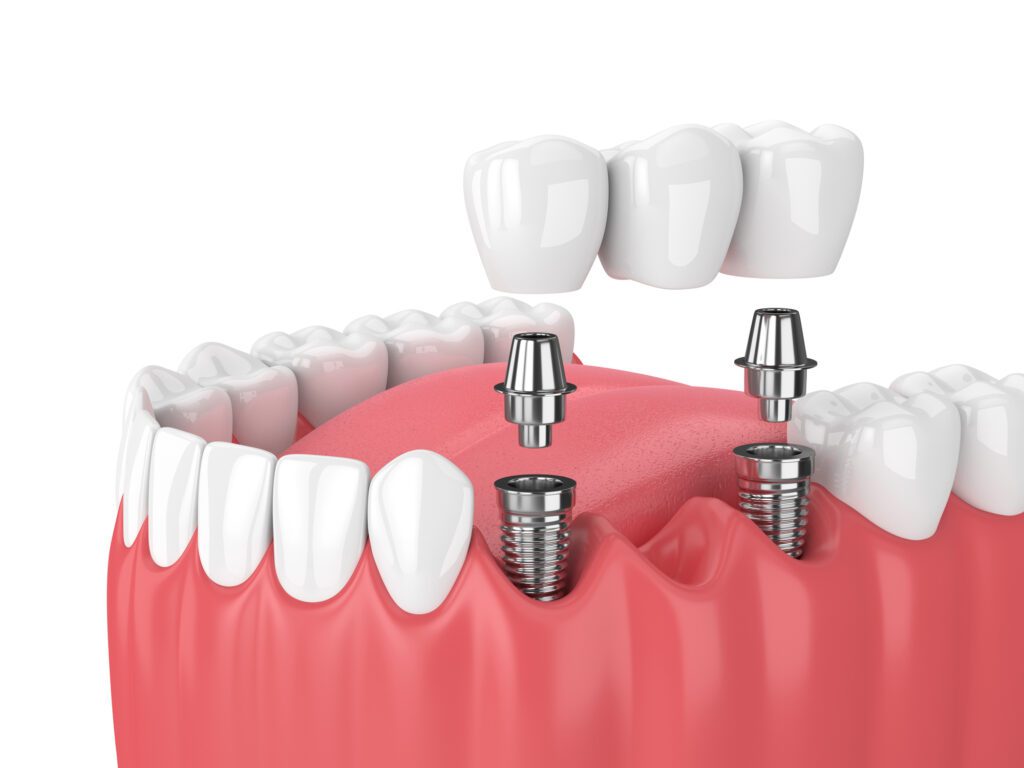Dental implants are gaining popularity because they are an effective option for replacing missing or damaged teeth. They are different from other tooth replacement options since they are more durable and stable. Dr. Elizabeth Duling offers dental implants for patients missing one or more teeth. Patients interested in the tooth replacement solution should be familiar with the process. However, if you are not, you can learn more about the dental implants procedure from Owens Cross Roads, AL dentist Dr. Duling.

The Dental Implants Procedure in Owens Cross Roads, AL
The dental implant process typically involves several steps. This includes your first consultation. Then, implant placement surgery, healing, and the final restoration.
Initial Consult and Evaluation
Each dental implant candidate will begin the process with a consult and thorough evaluation. You will meet with our dentist. She will review your medical history. Then, she will take dental X-rays and other necessary diagnostics to evaluate your oral health.
An exam will include a full exam of your teeth, gums, and jawbone. Our dentist will ensure you have enough bone density to support the implant fixtures. She will also use dental X-rays to determine proper implant placement.
We recommend bone grafting if you do not have enough jaw bone to support your implants. In addition, we can recommend root canal or gum disease treatment if you have tooth decay or gum disease. You must have healthy teeth and gums for implants.
If you are a good candidate for dental implants, Dr. Duling will develop a treatment plan for you. This custom plan will meet your specific needs and goals. It will include the number of implants you need and the implant type. The plan will also include where the surgeon will place your implants and what dental restoration you need.
Implant Placement Surgery
The next step is placing the implants in the jaw. Dr. Duling works with talented local oral surgeons for this step of the process.
They will cut your gums to access the jawbone. Then, they will make a small hole for each dental implant. Next, they will carefully insert the implant fixtures into the holes. The last step is to place a healing cap on the implant and close up the gums around it.
This surgical procedure is typically done under local anesthesia. You will not feel any pain during the procedure. However, you may experience swelling, bruising, and minor discomfort afterward. We will recommend using cold compresses and taking pain medication as you heal.
Healing and Integration
After surgery, there is a long period of healing and integration. It typically lasts between three and six months. During this time, the implants and the bone will fuse. This is called osseointegration.
Taking good care of your oral health during this period is essential. Follow all your dentists’ instructions to care for and maintain the implant site. You may need to stick to a soft diet and avoid hard or crunchy foods. Good oral hygiene will help prevent infection and help the implants thrive.
Attachment of Artificial Tooth or Teeth
The last step in the process is to secure your new teeth. Once the implant fixtures are fully fused with the bone, your dentist will secure each implant fixture’s connector piece, the abutment. This is a small metal piece that will help bring the implant and the dental restoration together.
It will take time for the abutment to heal. Then, once healed, Dr. Duling will secure the new dental restoration directly to the abutment.
We may recommend a dental crown secured to one dental implant if you are missing only a tooth. Our dentist can use multiple dental implants to secure a bridge if you miss several teeth. Between four and eight dental implants can secure a denture if you miss all the teeth on an arch.
Are Dental Implants Worth It?
For many patients, implant treatment is worth it for the lasting results. Dental implants provide many benefits to patients with missing teeth, including:
- Simple Care: Once you get your permanent crown, bridge, or denture, you can easily care for your new false teeth. You do not need to remove your restoration if you have an implant-supported crown, bridge, or denture. You can floss and brush with a soft-bristled toothbrush and non-abrasive toothpaste.
- Lasting Restorations: Implant restorations last longer than removable options. You do not need to replace your implant restoration as much as you would if it was removable. The metal implant screws are also permanent. The implants will stay in your mouth as long as you care for your health.
- Improved Dental Health: Replacing one or more missing teeth with dental implants prevents shifting teeth, overcrowding, tooth decay, and other common problems. If you do not replace missing teeth, you can lose more permanent teeth. Harmful bacteria and food debris can also build in the missing tooth sockets. Restoring missing teeth with implants can prevent these problems.
- Bite Function: Implants support restorations at the root. Because of this, implant restorations improve bite function over removable restorative options. Removable dentures and traditional bridges lay on the gums. They do not support the bite. However, once implants fuse with the jaw bone, they become new tooth roots that help you bite and chew more easily.
Dental implants may require more months to receive than a traditional bridge or denture. However, implants ensure a functional bite and good oral health.
Restore Lost Teeth
Improve the appearance and health of your teeth with implant dentistry. Book your consultation today with Dr. Duling to learn more about the dental implant procedure in Owens Cross Roads, AL. The implant process takes much longer than other teeth replacement solutions. However, dental implants offer a long-lasting, effective solution for replacing missing teeth.
If you have any questions about implant treatment, please get in touch with us. We will answer your questions and find the best implant treatment to replace lost teeth.
Learn more about dental implants on our website:
